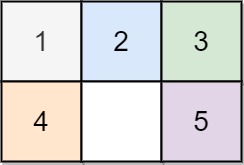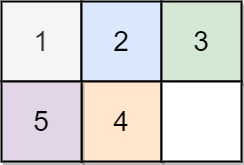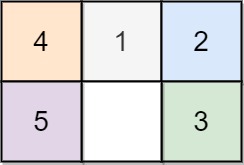Last updated on October 9th, 2024 at 06:23 pm
Here, We see Sliding Puzzle LeetCode Solution. This Leetcode problem is done in many programming languages like C++, Java, JavaScript, Python, etc. with different approaches.
List of all LeetCode Solution
Topics
Array
Level of Question
Hard

Sliding Puzzle LeetCode Solution
Table of Contents
Problem Statement
On an 2 x 3 board, there are five tiles labeled from 1 to 5, and an empty square represented by 0. A move consists of choosing 0 and a 4-directionally adjacent number and swapping it.
The state of the board is solved if and only if the board is [[1,2,3],[4,5,0]].
Given the puzzle board board, return the least number of moves required so that the state of the board is solved. If it is impossible for the state of the board to be solved, return -1.
Example 1:

Input: board = [[1,2,3],[4,0,5]] Output: 1 Explanation: Swap the 0 and the 5 in one move.
Example 2:

Input: board = [[1,2,3],[5,4,0]] Output: -1 Explanation: No number of moves will make the board solved.
Example 3:

Input: board = [[4,1,2],[5,0,3]] Output: 5 Explanation: 5 is the smallest number of moves that solves the board. An example path: After move 0: [[4,1,2],[5,0,3]] After move 1: [[4,1,2],[0,5,3]] After move 2: [[0,1,2],[4,5,3]] After move 3: [[1,0,2],[4,5,3]] After move 4: [[1,2,0],[4,5,3]] After move 5: [[1,2,3],[4,5,0]]
1. Sliding Puzzle LeetCode Solution C++
class Solution {
public:
string target = "123450";
vector<vector<int>> dir{{1,3},{0,2,4},{1,5},{0,4},{1,3,5},{2,4}};
int slidingPuzzle(vector<vector<int>>& board)
{
int m = board.size(),n = board[0].size();
string first = "";
for(int i=0; i<m; i++)
{
for(int j=0; j<n; j++)
{
first += to_string(board[i][j]);
}
}
queue<pair<string,int>> q;
unordered_set<string> visited;
q.push({first,0});
visited.insert(first);
while(!q.empty())
{
int sz = q.size();
while(sz--)
{
auto cur = q.front();
q.pop();
string s = cur.first;
int count = cur.second;
if(s == target)
{
return count;
}
int indx = s.find('0');
for(auto &x: dir[indx])
{
string temp = s;
swap(temp[x],temp[indx]);
if(!visited.count(temp))
{
visited.insert(temp);
q.push({temp,count+1});
}
}
}
}
return -1;
}
};2. Sliding Puzzle LeetCode Solution Java
class Solution {
int min = Integer.MAX_VALUE;
int[][] dirs = {{0, 1}, {0, -1}, {1, 0}, {-1, 0}};
public int slidingPuzzle(int[][] board) {
int[] zero = {-1, -1};
outer:
for (int i = 0; i < 2; i++) {
for (int j = 0; j < 3; j++) {
if (board[i][j] == 0) {
zero = new int[]{i, j};
break outer;
}
}
}
helper_backtrack(board, 0, new int[]{-1, -1}, zero);
return min == Integer.MAX_VALUE ? -1 : min;
}
public void helper_backtrack(int[][] board, int moves, int[] last, int[] curr) {
if (moves >= 20) return;
if (helper_isDone(board)) {
min = Math.min(min, moves);
return;
}
for (int[] dir : dirs) {
int i = curr[0] + dir[0];
int j = curr[1] + dir[1];
if (i < 0 || i >= 2 || j < 0 || j >= 3 || (last[0] == i && last[1] == j)) continue;
int[] newMove = {i, j};
helper_flip(board, curr, newMove);
helper_backtrack(board, moves + 1, curr, newMove);
helper_flip(board, curr, newMove);
}
}
public void helper_flip(int[][] board, int[] f, int[] s) {
int temp = board[f[0]][f[1]];
board[f[0]][f[1]] = board[s[0]][s[1]];
board[s[0]][s[1]] = temp;
}
public boolean helper_isDone(int[][] board) {
for (int i = 0; i < 2; i++) {
for (int j = 0; j < 3; j++) {
if (i == 1 && j == 2) return true;
if (board[i][j] != 3 * i + j + 1) return false;
}
}
return true;
}
}3. Sliding Puzzle LeetCode Solution JavaScript
var slidingPuzzle = function (board) {
const mapping = {0: [1, 3],1: [0, 2, 4], 2: [1, 5],3: [0, 4], 4: [1, 3, 5],5: [2, 4]
}
function swap(state, pos, next) {
let array = state.split('');
[array[pos], array[next]] = [array[next], array[pos]];
return array.join('');
}
let state = '';
board.forEach(row => state += row.join(''));
let visited = new Set(state);
let q = [[state, state.indexOf('0'), 0]];
while (q.length) {
let [state, pos, moves] = q.shift();
if (state == '123450')
return moves;
for (let next of mapping[pos]) {
let newState = swap(state, pos, next);
if (visited.has(newState))
continue;
visited.add(newState);
q.push([newState, next, moves + 1])
}
}
return -1;
};4. Sliding Puzzle LeetCode Solution Python
class Solution(object):
def slidingPuzzle(self, board):
src = ""
zero = 0
for i in range(len(board)):
for j in range(len(board[i])):
src += str(board[i][j])
if board[i][j] == 0:
zero = len(src)-1
target = "123450"
step = {0:[1, 3], 1:[0, 2, 4], 2:[ 1, 5], 3:[0, 4], 4:[3, 1, 5], 5:[4, 2]}
q = collections.deque()
q.append((src, 0, zero))
visit = set()
visit.add(src)
while q:
for _ in range(len(q)):
arr, count, pos = q.popleft()
if arr == target:
return count
for adj_index in step[pos]:
n_arr = list(arr)
n_arr[pos], n_arr[adj_index] = n_arr[adj_index], n_arr[pos]
n_arr = "".join(n_arr)
if n_arr not in visit:
visit.add(n_arr)
q.append(( n_arr, count+1, adj_index))
return -1